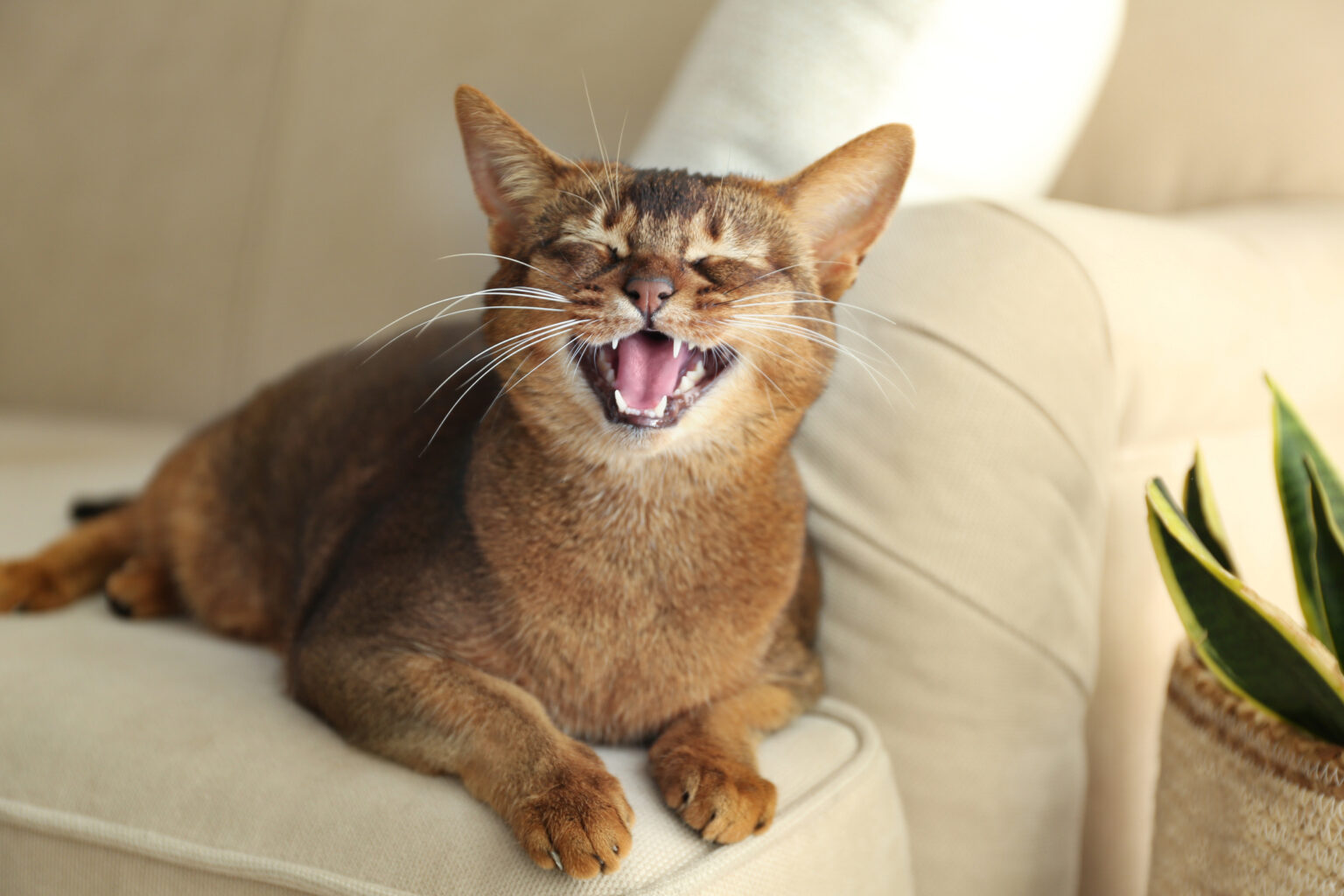The most likely cause of bad breath in your cat is gingivitis (inflammation of the gums) or feline stomatitis (inflammation of the oral mucous membranes at the back of the mouth).
What causes gingivitis and stomatitis in cats?
There are a number of factors that contribute to the development of chronic inflammation in the mouth and gums. It is thought that some cats have a hypersensitivity to bacterial plaque, known as plaque-intolerance. This results in a disease called lymphocytic-plasmacytic gingivitis feline stomatitis (LPGS), which affects the entire mouth. In this disease, certain cells (lymphocytes and plasma cells) in the immune system move into the tissue of the mouth. This can cause severe inflammation.
It is believed that cats suffering from other diseases; such as Feline Leukaemia Virus (FeLV), Feline Immunodeficiency Virus (FIV), Calicivirus, Feline Infectious Peritonitis (FIP), and Bartonella henselae are more susceptible to stomatitis and gingivitis.
Are some cats more susceptible?
Purebreds such as Siamese and Burmese cats and domestic shorthair cats are more prone. The disease can develop when the cat is very young, a ‘juvenile onset’ form of disease. It may occur at 3-5 months as the adult teeth are growing, becoming more severe by 9 months of age. Cats that are immune suppressed are at greater risk of contracting oral infections. These can become chronic.
What are the signs of chronic gingivitis and stomatitis?
Chronic gingivitis and stomatitis can cause severe pain affecting feline behaviour. They can cause irritability, aggressiveness, depression and reclusiveness. The cat may drool excessively, have difficulty eating or not eat at all. They will have very bad breath (halitosis) and possibly bleeding gums.
How is this disease diagnosed?
A physical exam will take place under anaesthetic. The existence of multiple red lesions will confirm the symptoms of the disease. There may also be ulcers or proliferative lesions. The lesions can be on the gums, roof and back of the mouth, tongue or lips. The lesions at the gum line surround the whole tooth. Usually, the area around the back teeth, the premolars and molars, is most affected and sometimes tooth resorption is seen. X-rays of the mouth can also be taken to show severe gum disease.
What is the treatment for chronic stomatitis/gingivitis?
If the chronic stomatitis/gingivitis is due to plaque intolerance, then it is essential all plaque is permanently removed. This is accomplished through:
- Half-yearly dental cleaning and polishing by your veterinarian.
- Extraction of teeth if there has been tooth resorption or severe gum disease
- Medication such as antibiotics, or others prescribed by your veterinarian
- Good nutrition. Due to discomfort cats may not eat as much meaning they need to take vitamin supplements.
Unfortunately, even with intensive care, the disease often progresses. If this occurs the only way to eliminate the lesions is to extract all of the teeth.
In cases of juvenile-onset gingivitis, professional teeth cleaning every 2 months accompanied by daily brushing at home for the first year of their life may allow for the prevention of gum disease in later years.
What are the other causes of bad breath in cats?
Tartar and plaque build-up around the teeth. Check the outer base of your cat’s teeth for a hard yellowish coating (plaque). As with people, small particles of food remain in the mouth after eating. These food particles decompose creating conditions where bacterium thrive. These bacterium grow to form plaque – a combination of bacteria, mineral and decomposed food. Plaque build-up clings to the base of the teeth causing the gums to become inflamed and recede.
Abscess or Infection. Check for reddish, swollen gums. As the infection spreads to the sinuses it generally results in a swollen face. Abscesses have to be drained by your veterinarian and the infected tooth may have to be extracted.
Diabetes, kidney disease, liver disease or an intestinal blockage.
Mouth ulcers, mouth sores or even cancer.
Something caught in your cat’s teeth or under her gums. For example, food, a strand of hair, or string can get lodged in between teeth and decompose. This will infect the surrounding tissue and cause a bad odour.
Teething. At the age of six months old, cats start losing their baby teeth. During this time, the gums appear red and swollen and you can see new teeth breaking out.
Canned and soft foods. These can also cause bad breath. Hard kibble helps to clean teeth and massage the gums without leaving a residue. As the cat chews there is excess production of saliva which dissolves any plaque that may have formed. Soft foods tend to get stuck between teeth and give off a bad odour once they decay. Special dental-specific diets have been formulated to help with this problem.
How can I prevent bad breath in cats?
You can help by keeping your cats mouth, teeth and gums healthy. Advanced gum disease can be irreversible and therefore prevention is very important. It is important to familiarise your cat from a very young age (kitten age) to having her teeth cleaned and checked on a regular basis. A good dental care program should include:
- Regular visits to your veterinary surgeon, which include an oral exam
- Veterinary dental cleaning as advised
- Put in place a daily oral hygiene regime. Various products are available to help reduce plaque formation including; Vet Aquadent, Plaque Off and Logic Oral Hygiene Gel.
- Brushing the teeth is the most effective way of preventing plaque and tartar build-up. Use a cat-specific dental kit including cat toothbrush and toothpaste.
- Specially formulated dental diets (some recommendations below)
Hills Science Plan Feline Oral Chicken
- Specially designed kibble helps clean your cat’s teeth and stop plaque and tartar build-up
- By controlling tartar, you make your cat less likely to suffer from nasty tummy issues
- Top-quality protein is great for strong, healthy muscles
- Delicious ingredients mean your cat will always look forward to dinnertime.
Royal Canin Oral Care Dry Adult Cat
- Suitable for cats over the age of one
- Minerals maintain a healthy urinary tract
- Kibble shape designed to ‘brush’ teeth as your cat crunches
- Contains a dental agent to trap calcium and prevent tartar
If you notice your cat has bad breath, it is always best to see your vet as soon as possible. If you try to inspect your cat’s mouth yourself there is a risk of getting bitten, although if your cat is calm you can lift the side of her lips regularly to see if there is any obvious plaque. Ask your vet to show you how to do this safely.



